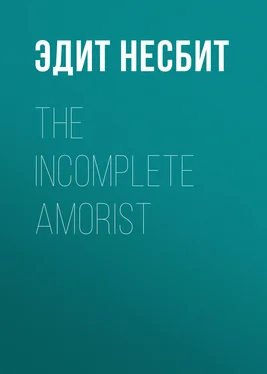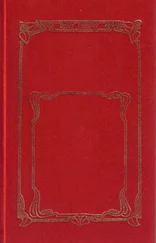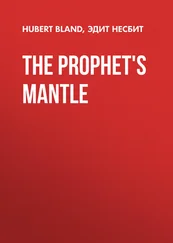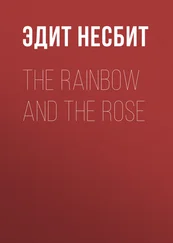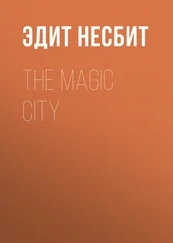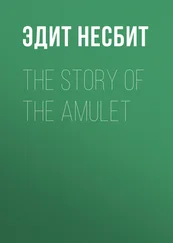Эдит Несбит - The Incomplete Amorist
Здесь есть возможность читать онлайн «Эдит Несбит - The Incomplete Amorist» — ознакомительный отрывок электронной книги совершенно бесплатно, а после прочтения отрывка купить полную версию. В некоторых случаях можно слушать аудио, скачать через торрент в формате fb2 и присутствует краткое содержание. Жанр: foreign_prose, foreign_antique, на английском языке. Описание произведения, (предисловие) а так же отзывы посетителей доступны на портале библиотеки ЛибКат.
- Название:The Incomplete Amorist
- Автор:
- Жанр:
- Год:неизвестен
- ISBN:нет данных
- Рейтинг книги:5 / 5. Голосов: 1
-
Избранное:Добавить в избранное
- Отзывы:
-
Ваша оценка:
- 100
- 1
- 2
- 3
- 4
- 5
The Incomplete Amorist: краткое содержание, описание и аннотация
Предлагаем к чтению аннотацию, описание, краткое содержание или предисловие (зависит от того, что написал сам автор книги «The Incomplete Amorist»). Если вы не нашли необходимую информацию о книге — напишите в комментариях, мы постараемся отыскать её.
The Incomplete Amorist — читать онлайн ознакомительный отрывок
Ниже представлен текст книги, разбитый по страницам. Система сохранения места последней прочитанной страницы, позволяет с удобством читать онлайн бесплатно книгу «The Incomplete Amorist», без необходимости каждый раз заново искать на чём Вы остановились. Поставьте закладку, и сможете в любой момент перейти на страницу, на которой закончили чтение.
Интервал:
Закладка:
Mrs. Symes was not so wrong as the delicate minded may suppose.
Betty did indeed desire to fall in love. In all the story books the main interest of the heroine's career began with that event. Not that she voiced the desire to herself. Only once she voiced it in her prayers.
"Oh, God," she said, "do please let something happen!"
That was all. A girl had her little reticences, even with herself, even with her Creator.
Next morning she planned to go sketching; but no, there were three more detestable books to be put into nasty little black cotton coats, the drawing-room to be dusted—all the hateful china—the peas to be shelled for dinner.
She shelled the peas in the garden. It was a beautiful green garden, and lovers could have walked very happily down the lilac-bordered paths.
"Oh, how sick I am of it all!" said Betty. She would not say, even to herself, that what she hated was the frame without the picture.
As she carried in the peas she passed the open window of the study where, among shelves of dull books and dusty pamphlets, her step-father had as usual forgotten his sermon in a chain of references to the Fathers. Betty saw his thin white hairs, his hard narrow face and tight mouth, the hands yellow and claw-like that gripped the thin vellum folio.
"I suppose even he was young once," she said, "but I'm sure he doesn't remember it."
He saw her go by, young and alert in the sunshine, and the May air stirred the curtains. He looked vaguely about him, unlocked a drawer in his writing-table, and took out a leather case. He gazed long at the face within, a young bright face with long ringlets above the formal bodice and sloping shoulders of the sixties.
"Well, well," he said, "well, well," locked it away, and went back to De Poenis Parvulorum .
"I will go out," said Betty, as she parted with the peas. "I don't care!"
It was not worth while to change one's frock. Even when one was properly dressed, at rare local garden-party or flower-show, one never met anyone that mattered.
She fetched her sketching things. At eighteen one does so pathetically try to feed the burgeoning life with the husks of polite accomplishment. She insisted on withholding from the clutches of the Parish the time to practise Beethoven and Sullivan for an hour daily. Daily, for half an hour, she read an improving book. Just now it was The French Revolution, and Betty thought it would last till she was sixty. She tried to read French and German—Télémaque and Maria Stuart. She fully intended to become all that a cultured young woman should be. But self-improvement is a dull game when there is no one to applaud your score.
What the gardener called the gravel path was black earth, moss-grown. Very pretty, but Betty thought it shabby.
It was soft and cool, though, to the feet, and the dust of the white road sparkled like diamond dust in the sunlight.
She crossed the road and passed through the swing gate into the park, where the grass was up for hay, with red sorrel and buttercups and tall daisies and feathery flowered grasses, their colours all tangled and blended together like ravelled ends of silk on the wrong side of some great square of tapestry. Here and there in the wide sweep of tall growing things stood a tree—a may-tree shining like silver, a laburnum like fine gold. There were horse-chestnuts whose spires of blossom shewed like fat candles on a Christmas tree for giant children. And the sun was warm and the tree shadows black on the grass.
Betty told herself that she hated it all. She took the narrow path—the grasses met above her feet—crossed the park, and reached the rabbit warren, where the chalk breaks through the thin dry turf, and the wild thyme grows thick.
A may bush, overhanging a little precipice of chalk, caught her eye. A wild rose was tangled round it. It was, without doubt, the most difficult composition within sight.
"I will sketch that," said Eighteen, confidently.
For half an hour she busily blotted and washed and niggled. Then she became aware that she no longer had the rabbit warren to herself.
"And he's an artist, too!" said Betty. "How awfully interesting! I wish I could see his face."
But this his slouched Panama forbade. He was in white, the sleeve and breast of his painting jacket smeared with many colours; he had a camp-stool and an easel and looked, she could not help feeling, much more like a real artist than she did, hunched up as she was on a little mound of turf, in her shabby pink gown and that hateful garden hat with last year's dusty flattened roses in it.
She went on sketching with feverish unskilled fingers, and a pulse that had actually quickened its beat.
She cast little glances at him as often as she dared. He was certainly a real artist. She could tell that by the very way he held his palette. Was he staying with people about there? Should she meet him? Would they ever be introduced to each other?
"Oh, what a pity," said Betty from the heart, "that we aren't introduced now !"
Her sketch grew worse and worse.
"It's no good," she said. "I can't do anything with it."
She glanced at him. He had pushed back the hat. She saw quite plainly that he was smiling—a very little, but he was smiling. Also he was looking at her, and across the fifteen yards of gray turf their eyes met. And she knew that he knew that this was not her first glance at him.
She paled with fury.
"He has been watching me all the time! He is making fun of me. He knows I can't sketch. Of course he can see it by the silly way I hold everything." She ran her knife around her sketch, detached it, and tore it across and across.
The stranger raised his hat and called eagerly.
"I say—please don't move for a minute. Do you mind? I've just got your pink gown. It's coming beautifully. Between brother artists—Do, please! Do sit still and go on sketching—Ah, do!"
Betty's attitude petrified instantly. She held a brush in her hand, and she looked down at her block. But she did not go on sketching. She sat rigid and three delicious words rang in her ears: "Between brother artists!" How very nice of him! He hadn't been making fun, after all. But wasn't it rather impertinent of him to put her in his picture without asking her? Well, it wasn't she but her pink gown he wanted. And "between brother artists!" Betty drew a long breath.
"It's no use," he called; "don't bother any more. The pose is gone."
She rose to her feet and he came towards her.
"Let me see the sketch," he said. "Why did you tear it up?" He fitted the pieces together. "Why, it's quite good. You ought to study in Paris," he added idly.
She took the torn papers from his hand with a bow, and turned to go.
"Don't go," he said. "You're not going? Don't you want to look at my picture?"
Now Betty knew as well as you do that you musn't speak to people unless you've been introduced to them. But the phrase "brother artists" had played ninepins with her little conventions.
"Thank you. I should like to very much," said Betty. "I don't care," she said to herself, "and besides, it's not as if he were a young man, or a tourist, or anything. He must be ever so old—thirty; I shouldn't wonder if he was thirty-five."
When she saw the picture she merely said, "Oh," and stood at gaze. For it was a picture—a picture that, seen in foreign lands, might well make one sick with longing for the dry turf and the pale dog violets that love the chalk, for the hum of the bees and the scent of the thyme. He had chosen the bold sweep of the brown upland against the sky, and low to the left, where the line broke, the dim violet of the Kentish hills. In the green foreground the pink figure, just roughly blocked in, was blocked in by a hand that knew its trade, and was artist to the tips of its fingers.
Читать дальшеИнтервал:
Закладка:
Похожие книги на «The Incomplete Amorist»
Представляем Вашему вниманию похожие книги на «The Incomplete Amorist» списком для выбора. Мы отобрали схожую по названию и смыслу литературу в надежде предоставить читателям больше вариантов отыскать новые, интересные, ещё непрочитанные произведения.
Обсуждение, отзывы о книге «The Incomplete Amorist» и просто собственные мнения читателей. Оставьте ваши комментарии, напишите, что Вы думаете о произведении, его смысле или главных героях. Укажите что конкретно понравилось, а что нет, и почему Вы так считаете.
